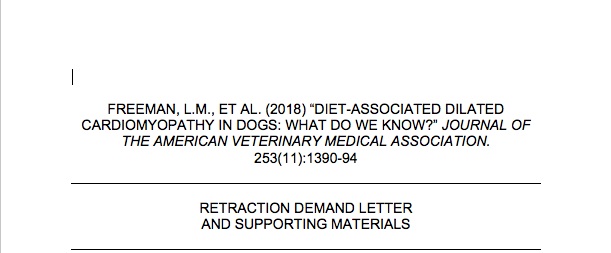DCM is a real disease.
It deserves real science.
Download the retraction demand letters HERE.
Please show your support by expressing it directly to the AVMA on this comments page.
On December 1, 2018, a group of prominent veterinary nutritionists and cardiologists published an article in JAVMA, the most reputable veterinary medical journal in the world. In the article, entitled “Diet-Associated Dilated Cardiomyopathy in Dogs: What Do We Know?,” they repeatedly assert that a group of pet food products that they call “BEG diets” are “apparently associated” with canine DCM.
Their article has been highly influential. It is by far the most-downloaded article to be published in JAVMA in the past year and its publication has received significant major media coverage as well. As a result, “BEG diets” (a term invented by the authors) have become central to how the veterinary community and the pet-owning public understands the etiology of DCM.
There’s just one problem. There is no evidence that “BEG diets” are associated with higher rates of canine DCM. Not one single study.
But the article got published in the leading peer-reviewed veterinary journal on the planet anyway. How? Because, unlike most topical evidence reviews published in medical journals, this one was never peer-reviewed. Its authors cleverly managed to avoid the peer-review process by labeling their article an opinion piece (what JAVMA calls a “Commentary”), even though it was explicitly concerned with a factual question (“What Do We Know” about diet-associated canine DCM), not an opinion.
Because it was never peer-reviewed, the article is rife with the kinds of false and misleading statements that reviewers surely would have caught if given the chance. It grossly mischaracterizes the evidence surrounding its subject, it relies on anecdotes and conjectures instead of evidence for its most basic assumptions, it misrepresents studies that were unpublished at the time it went to print, it overlooks suspicious methodological irregularities in recent DCM studies published elsewhere by its own authors, and its authors have financial ties (including undisclosed ones) to “Big Kibble” pet food companies with clear incentives to promote a link between “BEG diets” and canine DCM, even if one doesn’t really exist.
(To see just how far from the mark the article is, I urge you to compare it with this other diet-associated DCM evidence review, written by a collection of animal scientists and published in the Journal of Animal Science just a few months later. While the JAS paper is nuanced, fair, and rigorous in all the ways that the JAVMA one isn’t, the JAVMA one has been downloaded at least fifty times more often.)
All of this was explained in exacting detail in a pair of retraction demand letters that I sent to Dr. Kurt Matushek, the Editor-in-Chief of JAVMA, on July 26, 2019. You can download and read them by clicking HERE. These letters represent the culmination of a lengthy investigation I conducted over 2018-2019, one featuring dozens of interviews with veterinary nutritionists and other animal scientists, public records investigations at both the state and federal level, and independent biochemical and statistical analyses.
Who am I? My name is Daniel Schulof. I’m the author of a 2016 book about bad science and conflicts of interest in the veterinary nutrition community and, more recently, the founder of a “BEG” pet food company. So I’m motivated to correct the evidentiary record on this issue for several reasons: (1) I’m one of relatively few subject matter experts in a position to spot the malfeasance in the first place, (2) unlike many veterinary nutritionists who might share my perspective on these matters, I’m not beholden to Big Kibble to finance my work, (3) my own company (whose products most certainly do not give dogs DCM) is being unfairly defamed by the article, and (4) as a loving pet-owner myself, I’m highly motivated to ensure that the veterinary nutrition community holds itself to high standards of rigor, professionalism, and integrity.
It is my belief that the public is being led astray about this important topic and that makers of “BEG diets” are being unfairly scapegoated. Meanwhile, the real causes of canine DCM have been largely ignored. This needs to stop. This is a real disease that demands to be studied with real, rigorous scientific experimentation, not industry-funded propaganda.
About a month before sending these materials to JAVMA, I presented drafts at the 2019 American Association of Veterinary Nutrition conference. I also handed a copy directly to Dr. Lisa Freeman, the Tufts veterinarian who is the primary author of the offending article. Following the conference, the retraction demands were co-signed by more than 200 veterinarians, research scientists, medical professionals, representatives of the “BEG” pet food industry, and other stakeholders.
But, tellingly, to date Dr. Freeman has offered no response.
If you support my efforts and agree with my major conclusions, there are three ways you can help:
(1) Share this with site with your friends, family, and social media community. Use the social media icons below.
(2) Express your support directly to the American Veterinary Medical Association by following this link to the organization’s comment-submission form.
(3) Use the form below to sign up for e-mail updates.
Your help is very important. I believe that only a sizable amount of outside support will convince the JAVMA editorial board to give these arguments the good-faith consideration that they deserve.
Again, you can read the whole retraction demand package by clicking HERE.
Thanks for reading and thanks for your support.
- DGS
